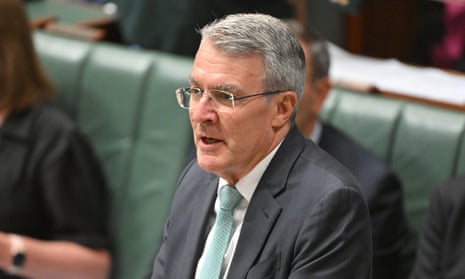Hate speech to be included in religious discrimination reforms
Paul Karp
Asked about the timing of hate speech laws, Mark Dreyfus appeared to confirm they will be included in and accelerate religious discrimination reforms.
He said:
We’ve already been working on the hate speech provisions. It is our intention to bring them forward with the religious discrimination bill that we plan to bring forward. The prime minister has asked me to accelerate the work on this hate speech part of that package.
Asked if leaking the contents of the WhatsApp group to Nine newspapers would qualify as doxing, Dreyfus equivocated:
We see that with massive changes in digital technology that is throughout our society that the opportunities for invasions of privacy, the opportunities for the use of people’s personal information without consent, the opportunities for really malicious actions to take place affecting hundreds or thousands of people very, very quickly has been made possible. Legislation has struggled to keep up. That’s part of the reason behind this reform of the Privacy Act that we’ve embarked on. And clearly though all of those things that needing to be looked at.
We also asked whether doxing laws would protect only religion and race, or other attributes such as sexuality and gender identity.
He replied:
Doxing is a broad term, but I think it’s generally understood to be the malicious release publicly of personal information of people without their consent. It takes different forms, it’s clearly got different malicious purposes, depending on the context. But that’s something that we’re going to have to deal with when we prepare this legislature.

Key events
Housing continues to be one of the biggest issues facing the parliament, with another fight set over the government’s shared equity scheme, ‘help to buy’. The Coalition have once again deployed the ‘no and moan’ strategy, which means they say no to a policy at the outset and then spend a lot of time moaning about the policy.
That leaves the Greens and the crossbench in the hot seat and the Greens want changes to negative gearing and capital gains tax. The government has given that a hard no, so the cycle of housing policy fight continues.
Meanwhile, AAP reports that Sydney is on track to become “the city with no grandchildren” as high housing costs drive young families to the regions and interstate.
NSW Productivity Commission research found Sydney lost twice as many people aged from 30 to 40 as it gained between 2016 and 2021.
The driving factor for the exodus was unaffordable housing costs, highlighting the need for greater housing density across the city, the research found.
“Sydney is losing its 30- to 40-year-olds; if we don’t act, we could become known as the city with no grandchildren,” Productivity Commissioner Peter Achterstraat said.
“Many young families are leaving Sydney because they can’t afford to buy a home, or they can only afford one in the outer suburbs with a long commute.”

Sarah Basford Canales
Parliamentary calendar to remain unchanged despite pushback
The finance minister, Katy Gallagher, says the 2024 parliamentary sitting calendar won’t change after the opposition suggested it wasn’t “family friendly” as it coincided with a number of public and school holidays.
This morning in Senate estimates, Gallagher is appearing alongside the Jenkins Report Implementation Team and officials from the Department of the Prime Minister and Cabinet.
It’s a little bit insider baseball but ensuring the parliamentary calendar is family friendly is a recommendation of the Jenkins report to make Parliament House a safer, more respectful workplace.
The Liberal senator Jane Hume quizzed the head of the Jenkins report team, Christy England, on whether she was consulted about the sitting calendar. She said she wasn’t.
Hume pointed out the last time politicians had to sit on the Thursday before Good Friday was 2008. She said that’s because it’s difficult for staff, particularly those returning to Western Australia, to get flights home the evening before the public holiday.
Gallagher responded the sitting calendar isn’t new – it was presented and agreed to by the Senate at the end of last year. The finance minister said changes had already been made, such as not having Friday sitting days and axeing evening divisions, but added it wasn’t possible to accommodate sitting weeks around every school holiday across the country.
Gallagher said she’d discuss with Hume about getting staff home before Good Friday.
What happens in the party room stays in the party room
The party room meetings are under way. We will bring you those updates when they start breaking up.
The parties hold their all-in meetings on Tuesdays (Monday is for cabinet, senior teams, separate Liberal and National party meetings and so on) and afterwards hold an “on background” briefing which details the minutes which were taken at the meeting.
It’s where you’ll often see “party room sources” used. No names are given about MP contributions, instead journalists have to work it out by speaking to people afterwards.
As we have discussed it is a weird Canberra quirk – what happens in party room stays in party room, except for the parts they release themselves.
Israel needs ‘to act with appropriate caution’, Birmingham says
The Liberal senator Simon Birmingham spoke to Sky News this morning where he was asked if he shared the “concerns” about Israel’s planned military offensive on Rafah. Birmingham responded:
Birmingham:
Well, it is important that Israel act with regard for international humanitarian law and be very mindful of the huge humanitarian toll that is occurring in Gaza. Obviously, there is massive displacement of individuals, and we still wish very clearly to support Israel, to see Hamas disabled and believe that the best pathway to ceasefire would be for Hamas to release the remaining hostages and the rescue of two hostages in the last day or so …
Q: Do you support the invasion, though, on Rafah of if that’s what it takes, a military operation?
Birmingham:
Well, it’s not a matter of whether I can sit here and say I support this action or that action. Israel needs to act with regard to international humanitarian law. They need to act with appropriate caution in terms of how they handle displaced people and ensure humanitarian support is there for them, and ultimately, they need to ensure that they are conducting these operations in ways that effectively target Hamas and the disablement of Hamas leadership and infrastructure.
Hate speech to be included in religious discrimination reforms

Paul Karp
Asked about the timing of hate speech laws, Mark Dreyfus appeared to confirm they will be included in and accelerate religious discrimination reforms.
He said:
We’ve already been working on the hate speech provisions. It is our intention to bring them forward with the religious discrimination bill that we plan to bring forward. The prime minister has asked me to accelerate the work on this hate speech part of that package.
Asked if leaking the contents of the WhatsApp group to Nine newspapers would qualify as doxing, Dreyfus equivocated:
We see that with massive changes in digital technology that is throughout our society that the opportunities for invasions of privacy, the opportunities for the use of people’s personal information without consent, the opportunities for really malicious actions to take place affecting hundreds or thousands of people very, very quickly has been made possible. Legislation has struggled to keep up. That’s part of the reason behind this reform of the Privacy Act that we’ve embarked on. And clearly though all of those things that needing to be looked at.
We also asked whether doxing laws would protect only religion and race, or other attributes such as sexuality and gender identity.
He replied:
Doxing is a broad term, but I think it’s generally understood to be the malicious release publicly of personal information of people without their consent. It takes different forms, it’s clearly got different malicious purposes, depending on the context. But that’s something that we’re going to have to deal with when we prepare this legislature.

Paul Karp
Dreyfus promises ‘stronger privacy protections’ in doxing ban
The attorney general, Mark Dreyfus, has spoken about plans to ban doxing and strengthen protections against hate speech.
Dreyfus told reporters in Canberra:
The Albanese government is committed to protecting the safety of Australians and stronger privacy protections for individuals are essential. The increasing use of online platforms to harm people through practices like doxing, the malicious release of their personal information without their permission is a deeply disturbing development.
The recent targeting of members of the Australian Jewish community through those practices, like doxing, was shocking. But sadly, this is far from being an isolated incident. We live in a vibrant multicultural community, which we should strive to protect. No Australian should be targeted because of their race or because of their religion.
The Albanese government committed last year to stronger protections for Australians through reforms to the Privacy Act …
The prime minister has asked me to bring forward as part of that, several reforms to privacy[laws], some new provisions, to deal with this practice of doxing with the s use of people’s personal information without their consent. And we’ll also be bringing forward … some provisions that strengthen current laws that deal with hate speech.

Peter Hannam
RBA’s Kohler says inflation coming down but services prices still high
Marion Kohler, head of the RBA’s economic analysis department, is addressing the annual forecasting conference of the Australian Business Economists in Sydney this morning.
Coming so soon after the RBA’s first two-day board meeting, release of its quarterly economics update and two “grillings” of governor Michele Bullock, it’s not surprising if Kohler’s comments sound familiar.
The economy is slowing, inflation continues to fall and the jobs market should hold up reasonably well, is the gist of things. Kohler, though, does expand on a few points.
One is that services price inflation “remains high and broadly based”.
We are forecasting that services inflation will decline from here, but only gradually as demand moves into better balance with supply and domestic cost pressures moderate.
(Since we’re mostly a services economy we can’t rely on deflation exported from China to get inflation down to the 2%-3% range. My two-fen’s worth.)
The RBA looks at a bunch of measures – 10 in fact – to assess if the labour market remains tight or loose. By most measures, it’s still tilting to the “tight” side of the ledger with “hires rate” the “loosest” but pretty much in the middle of its scale.
Kohler said:
Looking ahead, we expect the labour market to slow in response to the softening in economic growth.
We expect much of the adjustment in the labour market to happen through a decline in average hours worked.
If the latter forecast is correct, that would be a better result than people losing their jobs. And any uptick should still see the jobless rate “remain at low levels relative to the past couple of decades”.
We get the January labour market figures on Thursday from the ABS, so we’ll see how the 3.9% unemployment tracks. In the meantime, investors are betting there’s about a one-in-six chance of a cut in the RBA’s key interest rate when the board next meets, on 18-19 March.
Tony Burke says he has “no recollection” about criminal penalties being put into the legislation “at any time”.
Burke also spoke about some parliamentary tactics he says the opposition have been using to cut down on the time for debate:
The Opposition have a new strategy which is effectively to try to talk out the debate and to keep the debate going for as long as possible. They spent about 45 minutes this morning debating whether or not we would debate this today. Effectively, what they are doing is they are trying to fill up the parliamentary time so that we have less time talking about the tax cuts.
Burke quizzed on criminal penalties in right to disconnect bill
Tony Burke was on ABC’s 7.30 last night where he was pushed over whose idea it was to put criminal penalties for employers into the right to disconnect laws.
Q: Who came up with the idea of including criminal penalties for employers who break the rules?
Burke:
I don’t think it had been deliberately put there in the amendment that was moved but it was worked out that the effect of the amendment would interact with another section of the Bill and therefore there was a pathway where they could potentially be criminal penalties. That is why Senator Gallagher went ahead with wanting to seek leave to be able to introduce an amendment to fix it. And for reasons I will never understand, Senator Cash, on behalf of Peter Dutton, blocked that amendment and insisted that if the bill was going to go through, the criminal penalties would be there. So, I will introduce separate legislation on Thursday to fix that.
Q: Were there discussions about a possibility of having criminal penalties over the course of the last year since you have been considering this?
Burke:
No, there were discussions about fines and then effectively the idea came up during discussions with the crossbench and with business, I might add, that another way of doing this would be to simply give the right to the worker rather than frame it as the obligation on the employer. And when you did that, you ended up with the same outcome in terms of the change in balance but without some of the fear and alarm that would otherwise be there.
Thousands of sheep and cattle freed from ship in Fremantle after five weeks
The 16,000 sheep and cattle stranded aboard a live export ship, which was turned back from the Middle East and has spent about two weeks in a WA port, are being freed from the ship after more than five weeks at sea.
The animals have begun to be unloaded from the MV Bahijah. The ship had left Fremantle on 5 January but was ordered to abandon its voyage after concerns about Houthi rebel attacks in the Red Sea.
AAP reports the livestock would be put into [quarantine] yards for at least 10 days to rest and the exporter may look at obtaining another permit to export.
At least 60 animals had died on the ship.
What’s coming up in Senate estimates
It is also day two of the estimates hearings. Up today:
Environment and Communications, which today will focus on communications. The ABC is up just before lunchtime.
Finance and Public Administration, where it will be mostly about finance (so you can expect a lot of questions from Coalition senators about the stage three tax cut changes)
Legal and Constitutional Affairs – the attorney general’s department will be the main focus this morning. So it will be high court decision and Nacc appointees.
Rural and Regional Affairs and Transport – this one will be a bit of a mixed bag.
We will have Mark Dreyfus’s comments on doxing for you very soon.
There have been a few events on this morning for National Apology Day, and there is also the party room meetings, which means that the official proceedings for parliament will start a bit later today (as is usual for a Tuesday).
Catastrophic bushfire conditions in parts of Victoria today
Please take care if you are in Victoria today.
Schools and national parks will close as parts of Victoria face the first catastrophic fire conditions since the Black Summer of 2019-20.
Tasmania, South Australia and Western Australia are also braced for extreme fire danger amid heatwave conditions.
Hot, dry and windy conditions are forecast across Victoria on Tuesday, with the possibility of thunderstorms and dry lightning.
A catastrophic fire danger rating has been declared for the Wimmera region, extreme in the Mallee and high danger rating for rest of the state except for East Gippsland.
A total fire ban is in place for most of the state.
The emergency management commissioner, Rick Nugent, said Tuesday’s weather forecast, with some areas predicted to reach 40C, would be challenging
“We’re going to have an extremely hot, dry and windy day … followed by thunderstorms and lightning,” Nugent said on Monday.
“We are doing everything possible to make sure we are well prepared to respond to any fires that may occur anywhere in the state.”
Read the full report:
Sydney park closed after asbestos found in mulch

Tamsin Rose
An inner-city park has been closed after friable asbestos was found in mulch after an investigation by the City of Sydney.
The council on Monday night revealed it had been contacted by the New South Wales Environment Protection Authority last week that while investigating other cases, the council’s suppliers may have received contaminated products.
The council then began testing at Victoria Park at Broadway, Belmore Park near Central Station, Harmony Park and Prince Alfred Park in Surry Hills and Pope Paul VI Reserve in Glebe.
The dangerous friable asbestos was found in mulch at Harmony Park in Surry Hills, which has been closed.
“This park will be fenced off and temporarily closed. Signs will be installed, and the site cleaned,” a council spokesperson said.
Bonded asbestos was also found in much at Victoria and Belmore parks. Fences and signs will be installed at those parks while the material is cleaned up. The mulch was used in garden beds and under trees, not in playgrounds, the council stressed.
Survivors of stolen generations represent ‘gap within the gap’, advocates say

Lorena Allam
Today marks 16 years since the national apology to the stolen generations.
Advocates say that stolen generations survivors, who are growing old and in urgent need of redress, represent the “gap within the gap” of Aboriginal disadvantage.
The National Healing Foundation said today:
As the report is handed down today, we must recognise that Stolen Generations survivors are a ‘gap within the gap’, a statistical indicator of truth not reconciled.
As Stolen Generations survivors age, urgency grows. Many survivors have still not had access to redress schemes, a cornerstone of the Bringing Them Home report that was delivered nearly 30 years ago.
Survivors are ageing and face multiple challenges stemming from histories of forced removal, many will not access aged care services as a result.
We must ensure consistent and adequate compensation is seen by survivors in their lifetime. And with many survivors sadly passing away, there is no time to waste.
We invite Australians to stand alongside Stolen Generations survivors as we renew our call for the counting of actions, not anniversaries.
Malarndirri McCarthy then speaks about the voice being voted down and what that means for Indigenous people and policy making,
We have to we have to look at other opportunities. But I just want to remind your listeners that that came at the request of First Nations people. They had the solution and they gave that to us, but the country didn’t agree with it. What we have to do now is look at other ways.
Indigenous works package the ‘first step’ to overhauling CDP program, McCarthy says
The Labor senator Malarndirri McCarthy is speaking to ABC radio RN Breakfast this morning about the government’s announcement for an additional $707m for Indigenous work programs.
McCarthy says:
The community development program has many has had many iterations, even if we go back as far as the community development employment program in the 90s.
And one of the things we do know in terms of remote and regional areas is it is the sole source of employment opportunity for First Nations people in particular in those areas, but over the last five to 10 years, it has had some real serious problems.
And when we came to government, we said we needed to look at the CDP program … and abolish it because we recognise that didn’t have superannuation, it didn’t have holiday leave, it didn’t have all the entitlements that come with supporting workers.
So this is our first step. It’s the significant announcement that the prime minister is going to make today embarking on the future of this remote jobs program, and that we have to give some confidence to First Nations people across the states who are on the CDP currently, that we have a plan.
Albanese to deliver latest Closing the Gap report
Anthony Albanese will deliver the latest Closing the Gap report, just a week after the Productivity Commission warned that without major change, Closing the Gap would fail. As Josh has reported, the government has responded with an additional $707m for Indigenous work programs and we will hear more in the speeches today.
The question remains over whether the government will legislate a version of the voice, to ensure that local voices are heard by government.